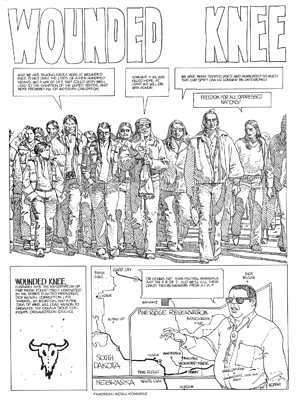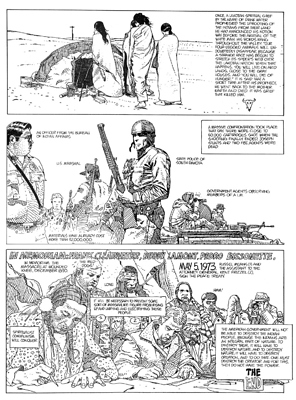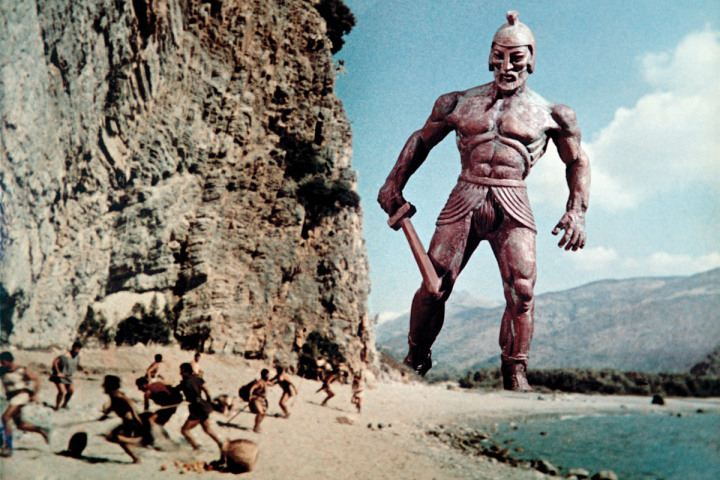Indeed a good review, not so much about the movie but more from the Indian perspective of how they are portrayed. I would love to know his idea about “Hostiles”
I’m going to have to check that film out. Films about Contemporary American Indians are always more authentic. I like to see human portrayals of Indian people and less stoic gags. The truth about the Indian of history is often sugar-coated by screenwriters to make up for negative portrayals (although it’s forgotten that many of the old westerns were rather pro-Indian). There is an assumption that people make about the portrayal of the Indians in cinema and history books and that is that we have been getting closer to “the truth” with each passing decade. This new version of “the truth” is to turn the tables and portray Indians as the heroes or at least as morally superior to their white adversaries. This viewpoint isn’t really the Indian point of view but that of other white Americans and Europeans. People claim that you should read Dee Brown if you want “the Indian side” even though Brown completely dismissed Indian scouts in the army as “mercenaries,” overlooking centuries of tribal animosity long before the Europeans arrived. As a result of this trend, Indians who fought alongside whites are transformed into villains themselves. The Pawnee, a tribe known for their friendliness towards Euro-Americans, have been depicted as exceptionally cruel and killing white settlers in films like Little Big Man and Dances With Wolves, something they never actually did. Anybody who knows their history will know that they were almost exterminated, not by the Euro-Americans, but by Sioux and Cheyenne. In an episode of Centennial, an Arapaho character brutally kills some Pawnee men. This killing is then justified because, as he argues, they assist the US army. This implies that was the only motivation even though the Pawnee only joined the US army for protection against their old enemies.
The Great Train Robbery (1903) was the first western but below is actual 1894 Sioux footage from around the time some of westerns were set.
“The Wild Angels” (1966, Peter Fonda)
“Hell’s Angels on Wheels” (1967, Jack Nicholson)
“Devil’s Angels” (1967, John Cassavetes)
“Hell’s Angels '69”
What can I say? Biker flicks.
Last ten days or so:
Best in Show (Guest, 2000) 



Oldboy (Park, 2003) 



Gladiator (Scott, 2000) 



[REC] (Balagueró/Plaza, 2007) 



Coffee and Cigarettes (Jarmusch, 2003) 




The Descent (Marshall, 2005) 



Watchmen (Snyder, 2009) 



Hannibal (Scott, 2001) 



The Dark Knight (Nolan, 2008) 



Sin City (Rodriguez, 2005) 



Collateral (Mann, 2004) 



Annabelle: Creation (Sandberg, 2017) 


The Meg (Turteltaub, 2018) 
Babel (Iñárritu, 2006) 



The Proposition (Hillcoat, 2005) 




Apocalypto (Gibson, 2006) 



Vanilla Sky (Crowe, 2001) 



Grizzly Man (Herzog, 2005) 




Battle Royale (Fukasaku, 2000) 



Moon (Jones, 2009) 




Traffic (Soderbergh, 2000) 




Mulholland Drive (Lynch, 2001) 




Ghost Stories (Dyson/Nyman, 2018) 


The King of Pigs (Yeon, 2011) 


Seoul Station (Yeon, 2016) 


That’s my “Favourites From the 2000s” challenge done, and straight into my “Favourites From the 2010s (so far)” challenge. Two movies per day again, throughout September and most of October until the last week when I’ll switch up to three a day but restrict myself only to horrors for a sort of Halloween week mini-challenge (although they’ll be 2010s horrors only, inkeeping with the rest of the Sept/Oct theme).
- Karukoski: Mielensäpahoittaja
- Altman: The Long Goodbye
- Warren: Manos the Hand of Fate
- Kozintsev & Trauberg: Shinel
- Laughton: The Night of the Hunter
- Cimino: Heaven’s Gate
- Windust: The Enforcer
- Godard: Contempt
- Laine: Niskavuori taistelee
- Pasanen: Koeputkiaikuinen ja Simon enkelit
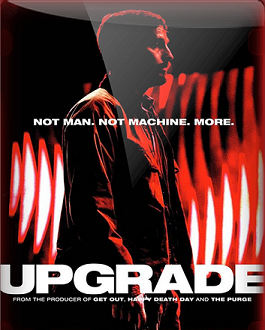
Upgrade (2018)
Wow, what a great si-fi action thriller this turned out to be, it had me hooked right from the beginning. Loved the concept, the fight scenes, and the acting was decent enough for this type of film. Definately a must for sci-fi fans like me.
A very fine movie but with a very weak ending
Not the expected guilty super shark meg pleasure then
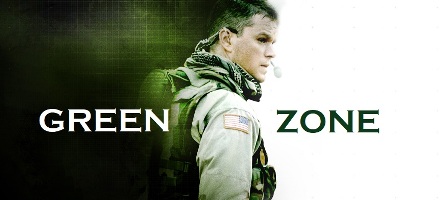
Green Zone (2010, Paul Greengrass)
***
A war-action movie, set in Baghdad’s green zone during the 2003 invasion of Iraq. Matt Damon is the leader of a US team searching for the weapons of mass destruction (WMD) that were the main alibi to invade the country. He’s unable to find them and discovers that the truth about the Iraqi WMD-plan is covered up by the US Defense Department.
Like most movies of this director, Green Zone is fast-moving and spectacular, but also often rather hectic and noisy. It’s a faction movie (fiction about facts, offering a possible explanation of what happened), like the more successful United 93. The events are presented as a good-versus-bad type of story, opposing the good, honest soldier to the treacherous, dirty politician. It all feels a bit too schematic and simplistic. If you watch it as a pumped-up thriller it’s great, if you expect a bit more, you’ll probably be disappointed.
One of the poorest movies I’ve ever seen in a cinema. Very nearly walked out, something I haven’t done since Morons From Outer Space (Hodges, 1985). I was going to gather my thoughts into a somewhat coherent review but the couple of attempts I took to do so resulted in a garbled, angry single-paragraph rant, like something a serial killer might leave at a crime scene. So, sod it. My capsule review of The Meg: Load of old bumshit. Avoid.
I’d love to read that TBH.
A historically and humanistically justifiable bias notwithstanding, Dee Brown’s Bury My Heart at Wounded Knee is a terrific book, the first comprehensive chronicle of “white America’s genocidal campaign against the Indian Nations” (Michael Coyne), albeit written at least a century too late. (As an off-topic aside: Three years after the publication of Brown’s book in 1970, the lamentable Wounded Knee incident occurred. Stanley David Lyman, who was the Bureau of Indian Affairs superintendent at the Pine Ridge Reservation in 1973, gives “a personal account” of the whole intricate affair in Wounded Knee 1973, published posthumously in 1991. And my favorite comics artist, Jean Giraud [alias Mœbius], drew two beautiful pages in reaction to the Wounded Knee crisis.)
The pro-Indian position already existed in America. Helen Hunt Jackson’s book, ‘A Century of Dishonor’ was published in 1881 and is a sort of predecessor to Bury My Heart at Wounded Knee. There’s nothing wrong with taking a more sympathetic approach but the problem with Brown is that he doesn’t really convey the Indian viewpoint as I pointed out. He takes the side of certain tribes over others. I don’t think one can be a serious student of the Indian wars and take sides. At the Treaty of Fort Laramie in 1851, a Sioux chief named Black Hawk said, “These lands once belonged to the Kiowas and Crows, but we whipped these nations out of them, and in this we did what the white men do when they want the lands of the Indians.” The Crows, who had lost territory to the Sioux and Cheyenne, became allies of the United States and frequently requested assistance. In 1866, a council was held at Fort Phil Kearney with the Cheyenne chiefs to discuss why they were invading the Crow reservation and they replied bluntly, “We stole the hunting grounds of the Crows because they were the best.” Many white settlers were sympathetic to the smaller tribes. The Indian commissioner, Alexander H. Redfield, even suggested that the US army build posts specifically for the purpose of defending Indian tribes like the Arikara against the Sioux and Cheyenne. All of this is very carefully left out of Dee Brown’s book and the tribes who formed alliances with the United States are dismissed as “mercenaries” assisting in genocide. He completely overlooks the ironic fact that forming an alliance with the United States saved them from a possible genocide, not by the Euro-Americans, but by other Indians. History is history and it’s better to have a non-judgemental view because it’s never black and white.
I suppose there should be another thread for discussing the history of the American West. It’s definitely something that interests me. Anyway, back the topic of movies, I just watched The Beguiled after all the Eastwood talk and really enjoyed it.
Yes, let’s leave it at that. Incidentally, the last movie I watched was Coppola’s The Beguiled. I was very disappointed, to say the least.
I don’t recall disliking it but, until you just mentioned it, I’d entirely forgotten that I’d seen it at all, and I can’t imagine that’s an especially good sign. I’m sure I thought that it felt far too similar to the Siegel original in form and intent to have been worth making at all but I could be way off base there. I’ve seen the remake once and the original twice (and not for years) which doesn’t really feel like enough for me to have fairly made that comparison.
Might be a problem of the DVD transfer (I watched the German release, titled Die Verführten) – but I found the entire film to be very dark (literally). During some of its many dimly lit scenes, it was really hard for me to see what was going on.
Traveled up to Dunfermline, Scotland yesterday to see a 55th anniversary screening of Jason and the Argonauts.
In attendance was 88 year old John Cairney who played Hylas in the film, and Ray Harryhausen’s daughter Vanessa. It was wonderful to chat to them about the film and Ray’s legacy.
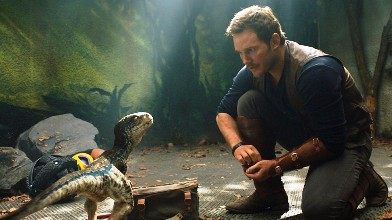
Jurassic World: Fallen Kingdom (2017, Juan Antonio García Bayona)
***½
The Fifth entry into the Jurassic franchise, a direct sequel to Jurassic World (2015). Jurassic World was presented as the first movie of a new trilogy, so this sequel can also be interpreted as the middle part of a new franchise.
In the previous movie, the dinosaurs were no longer simply presented as a threat: they had become real dramatic characters, with a personality of their own (notably Blue, the velociraptor raised by Owen, the dino whisperer). Fallen Kingdom goes one step further than its predecessor: the dinosaurs have become an endangered species and Owen and Claire, the two protagonists of the previous movie, return to the island to save Blue and her comrades.
The film was co-written by Colin Trevorrow, the director of Jurassic World, who told producer Steven Spielberg that he preferred not to direct the sequel and then suggested that Spanish director J.A. Bayona (best known for The Impossible) would take his place. The film is a bit too noisy and hectic, but the action scenes are overwhelming (watch it on a big screen) and there are a few clever details such as Jeff Goldblum returning as Malcolm, the expert in chaos theory, and a young girl who’s eavesdropping on everybody and is therefore called Maisie (you don’t see that very often in action movies: a reference to a Henry James novel).
